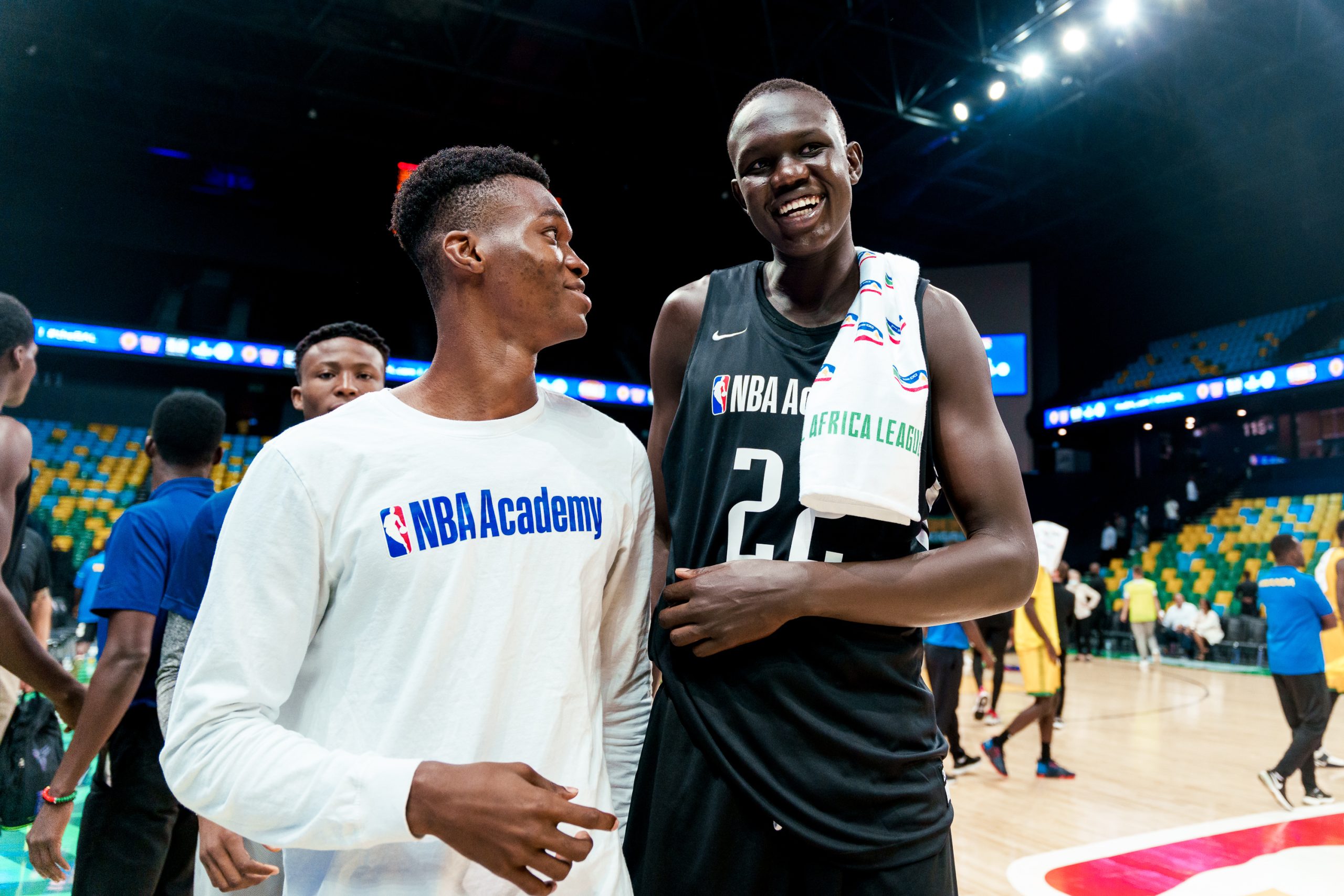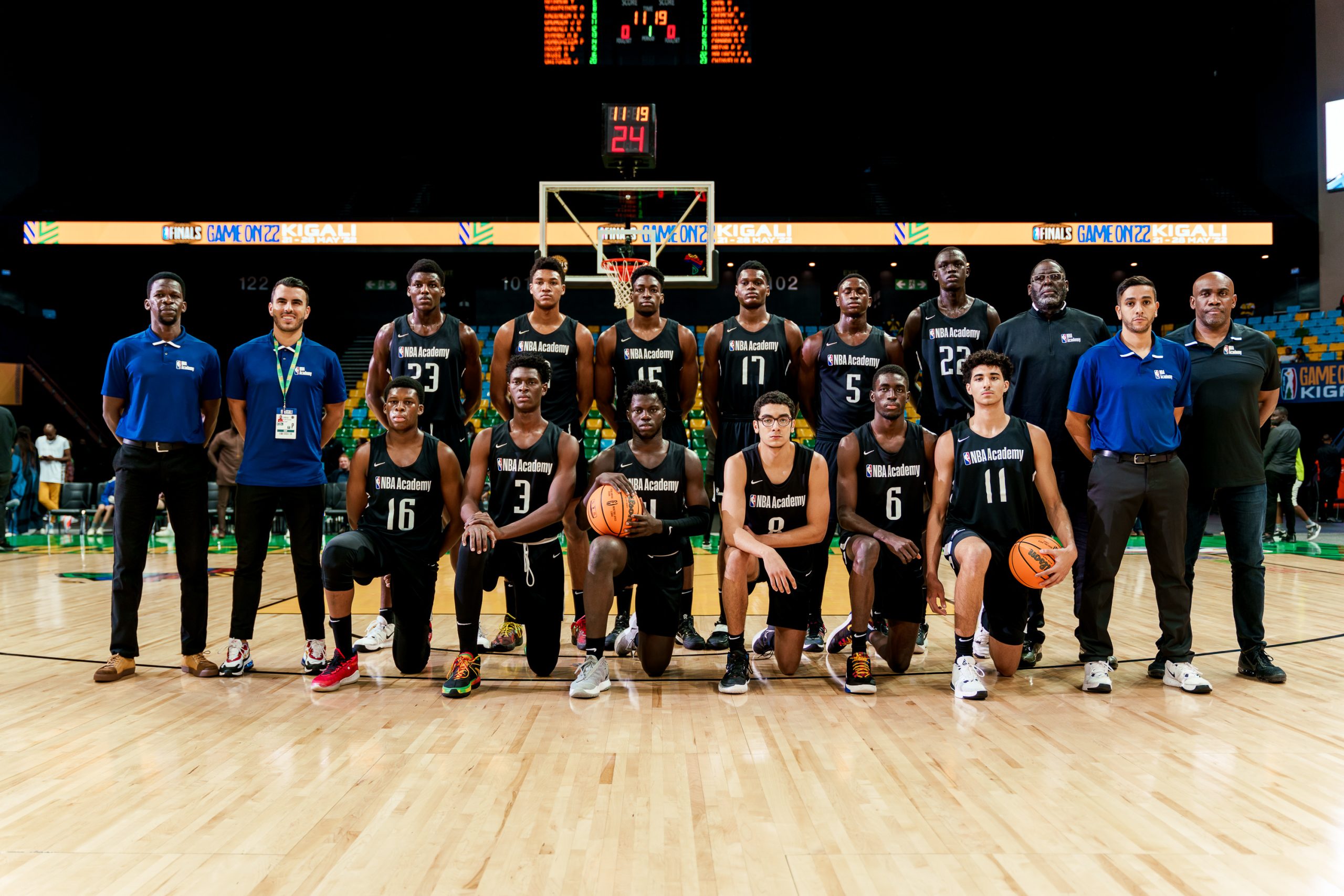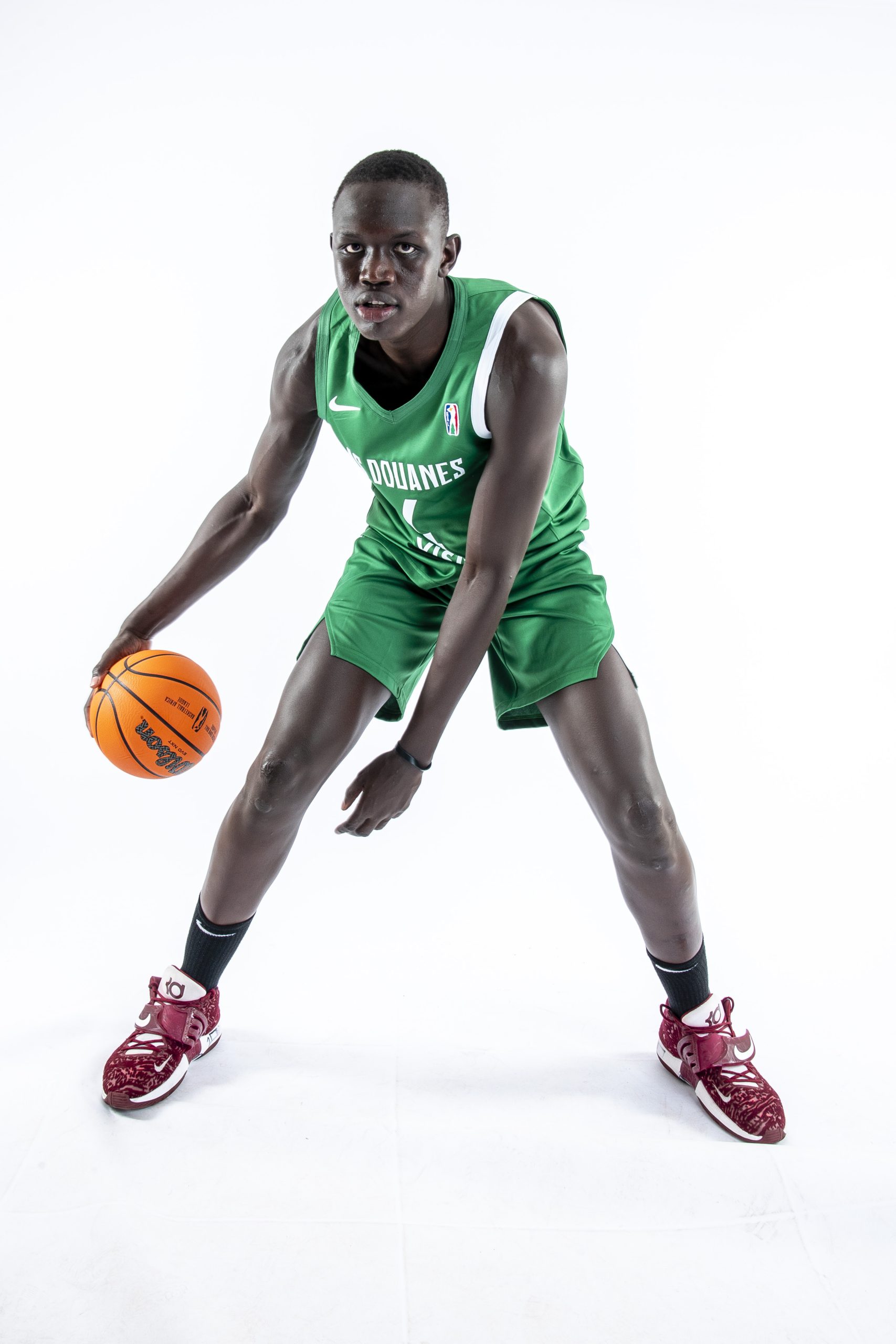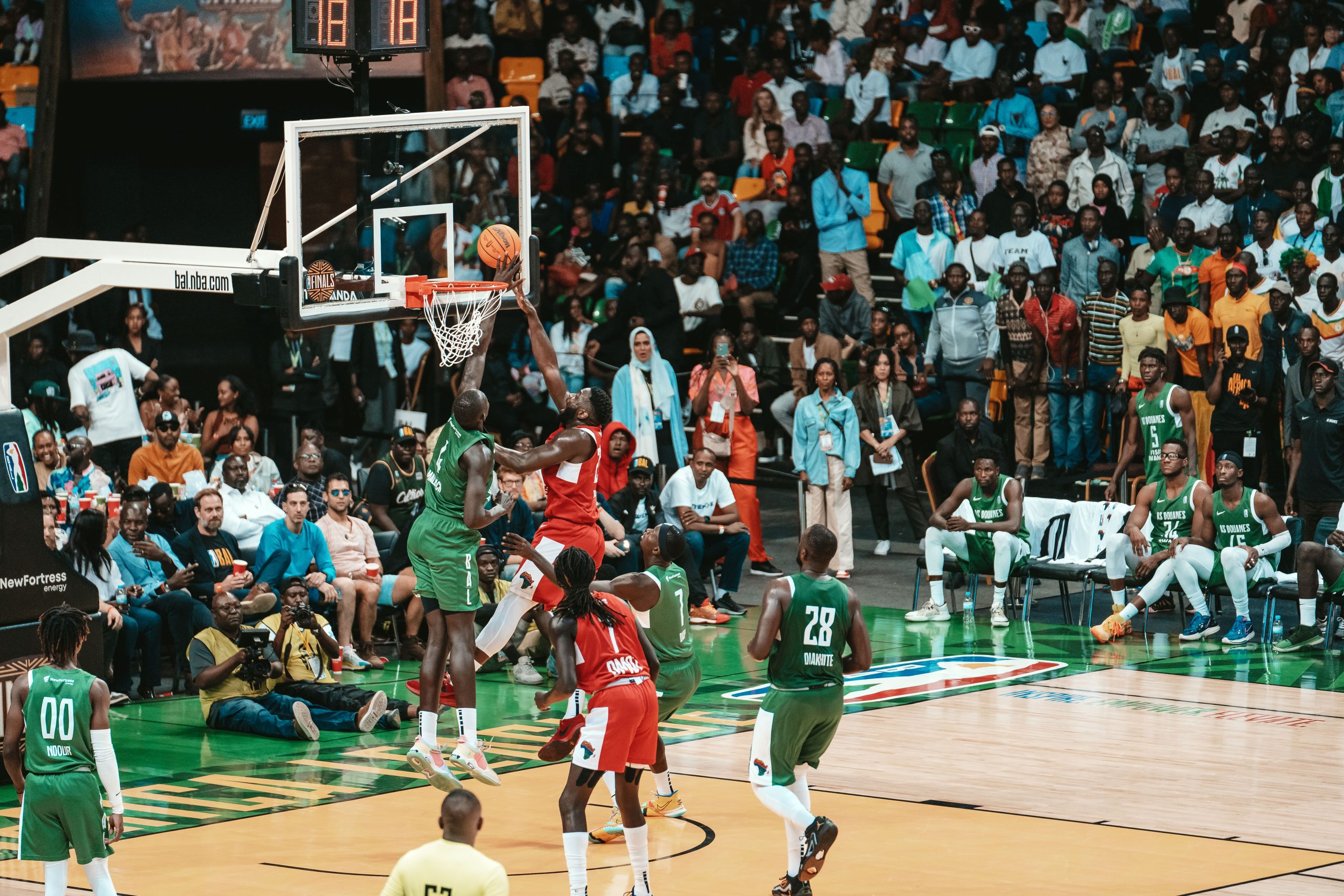In Kawempe, Uganda, where Khaman Madit Maluach grew up as a refugee from South Sudan, it’s a challenge just to play basketball.
The closest public court to Maluach was a 45-minute walk away and shared by multiple areas. “It was always packed,” he says. “If you had to go work on your skill set or work by yourself, you had to come maybe at 2:00 pm, when nobody’s there because it’s hot.”
Such limited access led Maluach to pursue other hobbies as a kid—primarily soccer. “The lack of facilities is the main thing,” he tells SLAM. It wasn’t until the end of 2019 when Maluach, then 13 years old, was persuaded to attend a basketball camp organized by former NBA All-Star Luol Deng, who also hails from South Sudan. Merely a spectator that day, Maluach was encouraged to see people his height (6-8) thriving on the floor. Basketball seemed like a game that he, too, could dominate. He had always been taller than his peers, eventually sprouting to a towering 7-2.

Not long after, a chance encounter in Kawempe launched Maluach’s own basketball journey. He was walking home one afternoon when Akech Wuoi Garang, a local high school coach at Bethel Covenant College, spotted him. Mesmerized by Maluach’s stature, Akech slammed the brakes on his bike and immediately went into recruiting mode. It mattered little that this rail-thin teenager had basically no basketball experience—Akech urged him to come play at Bethel Covenant, where his tuition would be taken care of.
“I trusted Akech because he was a South Sudanese coach,” Maluach explains. “He gave me a scholarship to go study at school. By then, school tuition was hard, so I took the scholarship and it motivated me. That’s how I got into the game.”
Maluach arrived at Bethel Covenant in January 2020, determined to make the most out of the opportunity. “As soon as I knew I could get a scholarship to a high school in Uganda, I knew that basketball could change my life,” he says. But a few months later, COVID-19 shut down life in the country, disrupting Maluach’s training. Stuck at home, he found creative ways to keep working. A big tire served as his hoop. He dribbled the ball Akech gave him everywhere. He watched clips of the NBA, studying stars such as Giannis Antetokounmpo, Kevin Durant, Anthony Davis and Joel Embiid. By the time he returned to school, Maluach was a completely different player.
The NBA Academy program, a year-round basketball development initiative, provides top high school prospects from outside the U.S. with elite coaching. Through a vast network of scouts and relationships with federations around the world, the academy is able to identify promising young athletes, all of whom receive full scholarships and become full-time students. NBA Academy Africa was founded in 2017 in Saly, Senegal, at the same time that academies opened in India and Australia. Since then, it has uncovered emerging talents like Thierry Darlan and Babacar Sané, both of whom play for G League Ignite, and Portland Trail Blazers center Ibou Badji.
“All over the world there’s so much talent,” says Chris Ebersole, head of international basketball development at the NBA. Other prominent NBA Academy graduates include Josh Giddey (Australia), Dyson Daniels (Australia), Bennedict Mathurin (Latin America) and Olivier-Maxence Prosper (Latin America). Ebersole continues: “If we can be proactive in making sure that that talent has the resources, the coaching, the infrastructure, and the competition, that helps make sure that there’s not a gap for people to slip through, which is a real thing in a lot of places around the world. For us to have a small part in trying to do that and build a pipeline—build a pathway—so that no matter where you’re born you have a shot, it’s really meaningful for us.”

On Wednesday, April 16, 2021, NBA Academy Africa offered Maluach a scholarship. For the next three nights, as he prepared for his trip to Senegal (and his first-ever plane ride), Maluach barely slept, overwhelmed with excitement. When he arrived, the jovial and driven South Sudanese kid—who’s always wearing a smile—made an immediate impression.
“He’s one of the most impressive young people you’ll ever meet,” Ebersole says. “It’s amazing how he carries himself with humility, with respect. That’s the thing that we love the most about him.”
Adds Franck Traore, head of basketball operations for NBA Africa: “Khaman is one of the most genuine and wonderful kids that we’ve ever seen. We’ve never had any single issue or complaint from a coach—from anyone—since he joined the academy. Always trying to do the right thing, always on time, always wants to do extra, have to kick him out of the gym.”
Days at the academy are long and busy—six hours of school plus four hours of training—but Maluach doesn’t mind the work. He has embraced a holistic approach to his development, which includes an emphasis on nutrition as well as strength and conditioning. “I never spend a day without working on my skill set,” Maluach says, “so that I can catch up with the guys who started way before me.”

Alfred Aboya, head coach of NBA Academy Africa, was born and raised in Cameroon and played at UCLA (2005-09) before a six-year professional career that included stints in France, Japan, Venezuela, Turkey, and the G League. Aboya knows firsthand the obstacles African players face without the support of the academy.
“I think the Achilles heel of African basketball has always been infrastructure,” he says. “We don’t have a lot of it. With NBA Academy being in Africa and having a gym open 24/7, you can go there and work and work. I think hard work works. If you’re in the gym all the time working on your craft, it will just be a matter of time until you start flourishing.”
For Maluach, improvement came at an unbelievably fast pace. He has developed a skill set that’s unique for seven-footers, especially those who just picked up the sport in 2020. On defense, he protects the rim with his 7-6 wingspan and has the versatility to switch onto smaller guards. He runs the floor exceptionally well, finishing fastbreaks with thunderous dunks. According to Traore, player development at the academy has started to focus increasingly on shooting. The evidence is clear with Maluach, who displays a smooth stroke and launches three-pointers without hesitation.
Those around the academy have been struck by how easily Maluach seems to pick up new skills. To call him “a sponge,” Traore says, undersells it. What Maluach has is “a gift,” an extremely rare ability to see something, replicate it and excel at it very quickly. “You take this kid and you put him next to Embiid—just put him there for a week. Every single thing that Embiid is doing, he will perfect it in a shorter period of time,” says Traore. “He watches and he listens to the coaches. Very smart kid.”
I never spend a day without working on my skill set.
— Khaman Maluach
Ulrich Chomche, a 6-11 forward from Cameroon also considered an NBA prospect, was at the academy before Maluach. The two have grown close since Maluach’s arrival. “He came when he was a baby; now he looks like a man,” Chomche says. “He has improved a lot. Before, when he just got to the academy, he was a mismatch for me. But now… he’s not anymore [laughs].”
The experience Maluach has received over the past few years is remarkable. He has traveled far and wide with the academy, competing against top talent from around the globe, and played a handful of games in the newly established Basketball Africa League (BAL). He was named MVP of the NBA’s Basketball Without Borders camp in early August. Later that month, he joined the South Sudan senior national team and became the third-youngest player in FIBA World Cup history. During BAL qualifiers in November, he averaged 21 points, 15.5 rebounds and 4.5 blocks, shooting 40 percent from behind the arc.

Maluach’s height alone made him an intriguing prospect, but his budding talent has turned him into a potential top-five pick in the 2025 NBA Draft.
“In Africa, we have a lot of seven-footers. Being a seven-footer is not special—definitely when you go to South Sudan,” says Traore, a former center himself who was born in Koudougou, Burkina-Faso, Africa, and went on to play at Manhattan College. “I was in South Sudan three weeks ago, where the security guard who is telling you don’t go this way is like 7-0; where the police officer who stamped my passport is 6-8. It’s incredible. When you [look] left and right, it’s like, What are you doing here? You’re supposed to be rebounding somewhere [laughs]. It’s the craziest thing. But [Maluach], he has that—obviously genetically—but he has other stuff. In South Sudan, being tall is not enough. What he has is the character piece and the work ethic piece and the talent. I’m sure you’ve seen a lot of tall guys that are not talented. He is that and he’s willing to really harness that [ability] and continue to work.”
Adds Ebersole: “There’s definitely high-end talent that’s come through the [NBA Academy] program but he’s right up there with any of them when you talk about Ben Mathurin, Dyson Daniels, Josh Giddey and O-Max. He’s in the mix with all those guys.”
Fans are not allowed at the annual G League Winter Showcase, so the event is always oddly quiet. Scouts, coaches, executives, and reporters seated at small tables around the court can hear all the action. On this Thursday morning at the Orange County Convention Center in Orlando, no voice stands out more than that of Khaman Maluach. NBA Academy Africa is playing an exhibition game against NBA Academy Latin America. Two days ago, on this same floor, Maluach had 22 points, 13 rebounds and 3 blocks—including four dunks and three three-pointers—against NBA Global Academy. The scouts are back to watch the blossoming big man, and he is once again making his presence known. His size is striking, yes, but also his energy and communication.
“He’s our leader on the team,” Chomche tells SLAM. “He’s the one who teaches me how to talk on the court. The day before, I was very quiet when I was playing defense. He told me, ‘You know if you start talking more on defense, you will impact more on the defensive side.’”
Maluach hit three more threes and held down the paint in a win over Latin America, leaving little doubt that he’ll be ready to make the leap to the NBA in 2025 (previously slated to graduate high school that year, Maluach reclassified just prior to the Showcase, per ESPN’s Jonathan Givony). Until then, he could stay with the academy and become the first player drafted directly from Africa, commit to one of the many blue bloods recruiting him (Duke, Kentucky, Kansas, UCLA, Baylor), or turn pro (both the G League Ignite and NBL Next Stars program have expressed interest, according to Givony).
“I think it’s the right decision because why not now?” Maluach says of his choice to reclassify. “That’s what I was asking myself. Why not now? I feel like it’s the right decision and I feel like it’s God’s plan.”
Alex Squadron is a writer from New York. His byline has appeared in SLAM, the New York Post, The Athletic, Sports Illustrated, Defector and SB Nation. His first book, Life in the G: Minor League Basketball and the Relentless Pursuit of the NBA, was released in October 2023.
Photos via Getty Images.
from Latest Sport Updates – My Blog https://ift.tt/nojewHz
via IFTTT